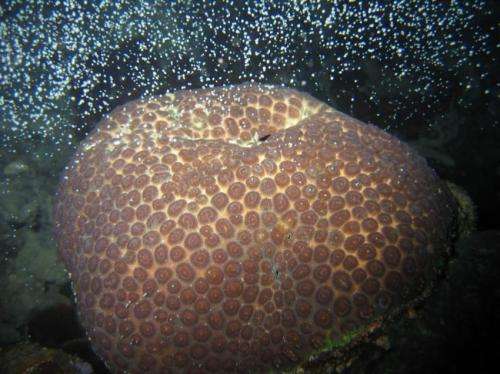More coral babies staying at home on future reefs

It seems that coral reefs are experiencing something their human counterparts have been for years – a shrinking "empty nest" syndrome.
That's right – researchers have found that increasing ocean temperatures due to climate change will soon see reefs retaining and nurturing more of their own coral larvae, leaving large reef systems less interconnected.
The study brought together an international group of researchers from NSU's Oceanographic Center; the Australian Research Council Centre of Excellence for Coral Reef Studies and the School of Marine and Tropical Biology at James Cook University in Australia; and Sesoko Station, Tropical Biosphere Research Center at the University of the Ryukyus, Japan.
"This research has potentially significant implications for understanding the future of coral reefs," said Richard Dodge, Ph.D., dean of NSU's Oceanographic Center. "It has benefited from the outstanding international collaborations the Oceanographic Center has with researchers at James Cook University (Australia) and the University of the Ryukyus in Japan."
These findings have both positive and negative implications.
"We found that at higher temperatures more coral larvae will tend to stay on their birth reef," says Joana Figueiredo, Ph.D., who is with NSU's Oceanographic Center but was with the ARC Centre of Excellence for Coral Reef Studies (Coral CoE) at James Cook University when the study began. "This is good news in an otherwise cloudy picture for isolated reefs, because in the future they will be able to retain more of their own larvae and recover faster from severe storms or bleaching events."
Figueiredo is the lead author of the study, entitled Increased Local Retention Of Reef Coral Larvae As A Result Of Ocean Warming, published today by Nature Climate Change.
Sean Connolly, Ph.D., also from the Centre of Excellence for Coral Reef Studies, explained that while more coral larvae will stay close to their parents, fewer will disperse longer distances, leaving reefs less connected.
"The loss of connectivity can make reef systems such as the Great Barrier Reef (in Australia) or the Florida Coral Reef Barrier more vulnerable," he said. "So interconnected reef systems that depend on the recruitment of coral larvae may take more time to recover after a disturbance, such as a hurricane, because fewer larvae will disperse from other reefs to the disturbed reef."
Connolly added that weaker connections between reefs means warm-adapted corals, such as those in the Caribbean, may take longer to expand their ranges to the north.
Similarly for isolated reefs, Saki Harii, Ph.D., from the University of the Ryukyus said: "While isolated reefs can retain more of their own larvae, this also leaves them with fewer possibilities to change their species composition to adjust to climate change."
Andrew Baird, Ph.D., from the Centre of Excellence for Coral Reef Studies said the implications of the research present management with both challenges and opportunities.
"Our results demonstrate that global warming will change patterns of larval connectivity among reefs," he said. "On a positive note, the stronger link between adults and recruits means an even greater benefit if we reduce local threats such as dredging and fishing methods that can damage corals," Dr Baird says.
Nevertheless, he said: "This does not reduce the need for global action on climate change."
More information: 'Increased local retention of reef coral larvae as a result of ocean warming' by Joana Figueiredo, Andrew H. Baird, Saki Harii and Sean R. Connolly appears in Nature Climate Change. www.nature.com/nclimate/journa … ll/nclimate2210.html
Journal information: Nature Climate Change
Provided by ARC Centre of Excellence in Coral Reef Studies



















